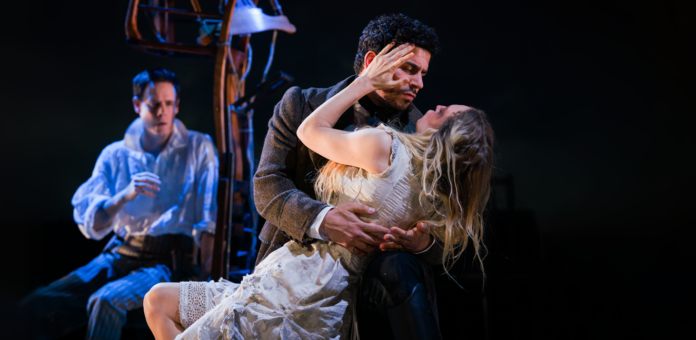Last week, I went on a school field trip with my AP Literature class to see Emily Rice’s musical production of Wuthering Heights at Berkeley Repertory theater. When I first heard of the play, I was a little confused as to how a cast would be able to turn Emily Brontë’s notorious gothic novel into musical production. I couldn’t have imagined the dark and brooding Heathcliff breaking down in song and dance. However, what I was met with exceeded my expectations and ingrained a deep impression in my mind.
When the lights finally went down, and chattering across the audience hushed, we were met with six actors, in gray overalls. Wuthering Heights is a notoriously hard book to follow, and luckily, the cast addressed this with a humorous take. Cast members used gray chalk boards to represent gravestones and this helped them communicate with the audience who was dead.
The entire cast consisted of 11 people, who each took on several roles throughout the play. They did a good job bringing energy to the play; however, at times, it felt pretty chaotic and hard to follow. Despite this, the cast did a great job conveying the theatrical and ominous elements of Wuthering Heights.
One original element of Rice’s play that stood out to me was the personification of the moor. Instead of having the housemaid be the storyteller, Jordan Laviniere took on the role of the moor. His expressive nature and impressive vocals really lit up the production. From his acting to his musical performances, every time he was on stage, he captivated the audience with his brilliant talent.
The story focuses on the tragic love between Heathcliff (Liam Tamne) and Catherine (Leah Brotherhead). Both actors truly embodied their characters and demonstrated the agony that love can cause. Brotherhead’s performance captured the wild child within Catherine’s story line. Something about her vocals not being perfect added to the character’s depth. Tamne did a spectacular job portraying Heathcliff. Not only was he able to put on the ominous front of his character, but his vocals were impeccable. The raw emotion that Tamne exerted drew in the audience and left it in awe.
However, I believe the music production in “Heights” was not the musical’s forte. The transitions from dialogue to song was not the smoothest and felt a little out of place. Likewise, the soundtrack ranges from folk to punk rock, and I felt this musical shift could have been executed better.
Overall, Alice Rice did an excellent job adapting the classic gothic novel into a punk musical production. She truly captures the key elements of the novel. From the play’s opening storm scene to the inclusion of paranormal activity, the eeriness of the Wuthering Heights was truly brought to life.The play really embodied the tragedy, love, and other major themes of the novel. Furthermore, “Heights” creatively conveyed Emily Brontë’s message that passion isn’t sustainable.
Wuthering Heights will continue to play at Berkeley Rep Theater until January 1st, so get tickets while you can.
